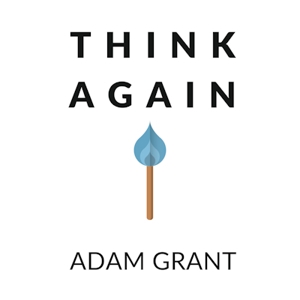This website uses cookies
This website uses cookies. For further information on how we use cookies you can read our Privacy and Cookie notice
This website uses cookies. For further information on how we use cookies you can read our Privacy and Cookie notice
In stock
Easy Return, Quick Refund.Details
QABETE ENTERPRISES
88%Seller Score
62 Followers
Shipping speed: Excellent
Quality Score: Good
Customer Rating: Good






Think Again: The Power of Knowing What You Don't Know by Adam Grant explores the critical skill of rethinking—the ability to question and update our beliefs, opinions, and decisions in a rapidly changing world. Grant argues that while people often form strong convictions quickly, they rarely pause to reconsider or unlearn what they think they know, which limits growth and adaptation.
Individual Rethinking:
Grant encourages adopting the mindset of a scientist rather than a preacher, prosecutor, or politician—meaning we should treat our beliefs as hypotheses to test, rather than absolute truths to defend or promote. Embracing doubt and being willing to be wrong fuels curiosity and learning.
Interpersonal Rethinking:
The book teaches how to persuade others not by winning arguments but through persuasive listening, asking thoughtful questions, and creating safe spaces for dialogue that invite people to reconsider their views without feeling attacked.
Collective Rethinking:
Grant emphasizes building cultures—in families, workplaces, schools, and communities—that value curiosity, humility, and ongoing learning, allowing groups to adapt and innovate effectively.
The joy and power of being wrong: embracing mistakes as opportunities to learn.
Overcoming biases like confirmation bias and the Dunning-Kruger effect, which prevent self-awareness of flawed knowledge.
The benefits of intellectual humility and mental flexibility over dogmatic consistency.
Harnessing impostor syndrome positively, using it as motivation to learn more.
How rethinking helps resolve polarized debates and build bridges in difficult conversations.
Define your identity around values like curiosity rather than fixed opinions.
Replace "Why?" questions with "How?" to open communication.
Surround yourself with people willing to challenge you.
Create environments where changing your mind is seen as strength, not weakness.
Anyone seeking personal or professional growth through better thinking habits.
Leaders and educators wanting to foster cultures of open-mindedness.
People interested in decision-making, psychology, communication, and innovation.
Think Again blends engaging storytelling with scientific research to illustrate why rethinking is a vital but undervalued skill. It offers a roadmap to overcome rigid thinking, embrace uncertainty, and thrive in complexity by cultivating humility, curiosity, and intellectual courage.






Think Again: The Power of Knowing What You Don't Know by Adam Grant explores the critical skill of rethinking—the ability to question and update our beliefs, opinions, and decisions in a rapidly changing world. Grant argues that while people often form strong convictions quickly, they rarely pause to reconsider or unlearn what they think they know, which limits growth and adaptation.
Individual Rethinking:
Grant encourages adopting the mindset of a scientist rather than a preacher, prosecutor, or politician—meaning we should treat our beliefs as hypotheses to test, rather than absolute truths to defend or promote. Embracing doubt and being willing to be wrong fuels curiosity and learning.
Interpersonal Rethinking:
The book teaches how to persuade others not by winning arguments but through persuasive listening, asking thoughtful questions, and creating safe spaces for dialogue that invite people to reconsider their views without feeling attacked.
Collective Rethinking:
Grant emphasizes building cultures—in families, workplaces, schools, and communities—that value curiosity, humility, and ongoing learning, allowing groups to adapt and innovate effectively.
The joy and power of being wrong: embracing mistakes as opportunities to learn.
Overcoming biases like confirmation bias and the Dunning-Kruger effect, which prevent self-awareness of flawed knowledge.
The benefits of intellectual humility and mental flexibility over dogmatic consistency.
Harnessing impostor syndrome positively, using it as motivation to learn more.
How rethinking helps resolve polarized debates and build bridges in difficult conversations.
Define your identity around values like curiosity rather than fixed opinions.
Replace "Why?" questions with "How?" to open communication.
Surround yourself with people willing to challenge you.
Create environments where changing your mind is seen as strength, not weakness.
Anyone seeking personal or professional growth through better thinking habits.
Leaders and educators wanting to foster cultures of open-mindedness.
People interested in decision-making, psychology, communication, and innovation.
Think Again blends engaging storytelling with scientific research to illustrate why rethinking is a vital but undervalued skill. It offers a roadmap to overcome rigid thinking, embrace uncertainty, and thrive in complexity by cultivating humility, curiosity, and intellectual courage.
1 BOOK

This product has no ratings yet.
/product/95/0313523/1.jpg?7607)